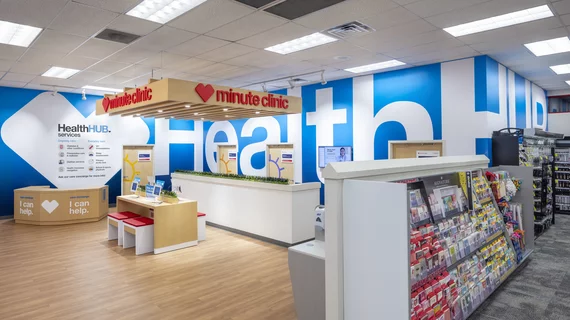CVS will open 600 HealthHub locations in 2020
CVS Health is on track to expand its HealthHub store concept to more than 600 locations in 2020, the company revealed during a presentation at the J.P. Morgan Healthcare Conference in San Francisco.
The HealthHub concept––which was launched early in 2019 following CVS’ merger with the nation’s third-largest health insurer, Aetna––offers new healthcare services, products, kiosks for consumers and other digital tools to give people a more complete healthcare stop.
CVS Health recently celebrated its one-year anniversary since combining with Aetna in a $69 billion deal that closed at the end of 2018.
According to CEO Larry Merlo, HealthHub’s can meet about 80% of primary care needs. Further, CVS announced it plans to expand to 1,500 HealthHub locations by the end of 2021. The first stores, which were piloted in Houston, increased foot traffic to CVS locations, boosted higher store margins and MinuteClinic visits, and more prescriptions were dispensed. The company ended 2019 with 50 locations in Houston, Tampa, Atlanta and Philadelphia.
“Our integrated pharmacy and medical data are enabling preventive care and treatment in lower cost care settings,” Merlo said during the conference presentation. “Avoiding costly emergency room visits is just one example. Another important component of our transformation is our new health plan offerings. And we're offering many new innovative programs to help our clients and their members, help them improve their health and stay healthy.”
The HealthHub concept refigures a portion of a CVS store to bring in new services.
“About 75% of the U.S. population actually lives within a few miles of a CVS,” Merlo said. “So, we've repurposed about 20% of what we call that front of store to more health-related services.”
The new locations coming in 2020 and 2021 are also strategic.
“There is a direct link between the ZIP codes associated with Aetna membership and the locations of these HealthHubs,” he said.
Merlo also described programs that aim to manage chronic disease, as well as Healing Better, a hospital-to-home care program. CVS is also working on two programs to manage chronic kidney disease by using data analytics to identify high-risk patients. The second program, which is FDA-approved and undergoing clinical trial, involves a new home hemodialysis device for more frequent dialysis. Many of these programs offer low or no copay options for Aetna members, as well.
While CVS is expanding its new services and offering new solutions for its customers, there could be some friction as the company transforms. That’s because consumers are still somewhat split on receiving primary care services from a CVS store instead of their primary care physician, according to one survey last year. More than half of survey respondents at the time said they would not or probably not receive primary care from a CVS-based clinic, though younger patients were more likely to seek out care in CVS-based clinics.
PBM business
Merlo also defended the role of pharmacy benefit managers (PBMs) in the healthcare space during the presentation. PBMs have come under fire in the last couple years, being pinned as the “middlemen” in the industry between health insurers and drugmakers. The Trump administration even considered doing away with the rebate system in its entirety, which would be a big threat to the PBM business model, which negotiates rebates.
“I think the data has proven out that PBMs have been effective in reducing the net cost of care, and those dollars have been passed back to consumers, whether it's at the pharmacy counter and point-of-sale rebates or in the form of lower monthly insurance premiums,” Merlo said.
CVS also is looking for opportunities in value-based care to evolve as one of the nation’s largest PBMs.
“We're starting with our transform care programs, where we have outcomes-based, whether it's around adherence, whether it's around reducing A1C [diabetes management],” Eva C. Boratto, excecutive vice president and CFO at CVS Health, said during the presentation. “And I think with our community assets and the touch points and what we're building with the HealthHubs, we see real opportunity to continue to bring this model forward.”

